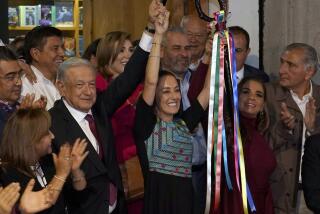Ortega Ousts Mediator, Offers Direct Contra Talks
- Share via
MANAGUA, Nicaragua — The Sandinista government Wednesday dismissed Cardinal Miguel Obando y Bravo as mediator in the Nicaraguan conflict and offered to meet with rebel leaders for cease-fire talks inside the country.
President Daniel Ortega made the surprise announcement after an evening visit to the Roman Catholic leader, who had irritated the government by putting political issues on the agenda in four previous negotiating sessions.
The shift in government strategy came on the eve of a vote in the U.S. Congress on a Democratic bill for $30 million in non-lethal aid to the rebels, whose U.S. military assistance was cut off a month ago.
Ortega proposed that direct talks on strictly military aspects of a cease-fire be held without a mediator, for three days starting next Wednesday, at a Nicaraguan customs house in Sapoa, on the Costa Rican border. The offer reversed a longstanding Sandinista refusal to negotiate with the Contras inside Nicaragua.
The president named his brother, Defense Minister Humberto Ortega, to head an upgraded government delegation to the proposed talks, and urged the Contras to send its six-member directorate.
“We have reached a decisive point,” Ortega said after the 20-minute meeting with Obando. “We are testing whether the (Contras) are really willing to work for a cease-fire.”
Rebel leaders reacted negatively to the announcement, without rejecting the government offer.
Bosco Matmamoros, a Contra spokesman, called the dismissal of the mediator a “shock” and “a very great setback for the peace process.” He said the rebel directorate will meet to discuss whether to resume the peace talks.
“The Sandinistas are trying to eliminate the witness who gives credibility to this process of negotiations,” Matamoros said in a telephone interview. “It was Obando who has tried to hold the Sandinistas to their promises to democratize Nicaragua.”
Obando had been the Sandinistas’ most prominent domestic critic when Ortega asked him last November to mediate an end to the 6-year-old war under terms of the Central American peace accord. But the president appeared in recent days to have lost faith in the cardinal’s impartiality.
The two men, Nicaragua’s leading public figures, exchanged unusual open letters last week blaming each other for the breakdown of the last round of peace talks Feb. 19.
At that meeting in Guatemala, Obando proposed conditioning a preliminary 30-day truce on government amnesty for all political prisoners, full press freedom and a revision of the military draft law.
Obando abruptly suspended the talks when the Sandinista delegation, after receiving instructions by telephone from Ortega, balked at his proposal without rejecting it. Ortega accused the cardinal of calling off the talks prematurely, without consulting either side.
Last week, the mediator outlined a similar agenda for the next round of talks.
Instead of accepting it, Ortega decided to dismiss Obando. The president said “his services as a mediator are no longer necessary” because the government is now willing to hold face-to-face talks inside Nicaragua.
“I told the cardinal we could not have reached this decisive moment had it not been for his contribution in the first phase of the mediation,” before the Sandinistas agreed to direct talks with the Contras, Ortega said.
“I have thanked him for all his efforts,” the president said.
The cardinal, who met later with reporters, said he had no choice but to resign if one of the warring factions didn’t want him. He declined to call the government offer a positive step but said he hoped for the success of any future negotiations.
“I’m worried about the death of our people,” he said. “The situation frightens me.”
Obando defended his last mediation proposal and said it will be difficult to settle the conflict by negotiating only the technical aspects of a cease-fire. Rebel leaders said they would continue to insist on a political agenda if any further talks are held. They say the government has failed to comply with the regional peace accord Ortega signed last August because it still holds at least 3,300 political prisoners and forces young men to do military service.
Ortega insisted again Wednesday night that the five-nation peace accord calls for cease-fire talks with rebel groups and political dialogue with unarmed opposition leaders, including rebels who accept amnesty.
But Contra spokeswoman Marta Sacasa said: “They want to disarm us without removing the causes of why we are armed.” She called Ortega’s dismissal of Obando and his effort to focus the talks on military issues “a negative signal, a harder line.”
Ortega presented his offer as a final concession to the rebels, who had called for negotiations inside Nicaragua, but denied timing it to influence the Congress.
More to Read
Sign up for Essential California
The most important California stories and recommendations in your inbox every morning.
You may occasionally receive promotional content from the Los Angeles Times.










